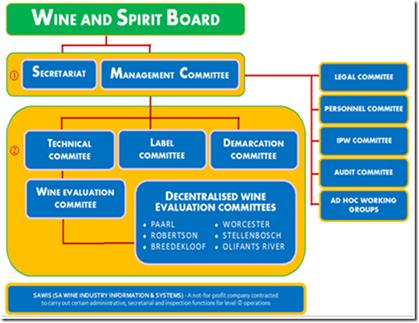Wine & Spirit Board
Composition
In accordance with the provisions of the Liquor Products Act of 1989, which replaced the previous Act of 1957, the control function regarding Wine of Origin, cultivar, vintage, Estate Brandy and Integrated Production of Wine, fall under the Wine and Spirit Board. The Board is appointed by the Minister of Agriculture, Land Reform and Rural Development and consists of a chairperson and 12 members. Of these, eight are persons with the relevant knowledge, skills or expertise in viticulture, oenology, distilling, regulatory environment of the liquor industry, liquor production, food safety or microbiology; three are Department of Agriculture, Land Reform and Rural Development officers; one person is nominated by the Agricultural Research Council; and one person is designated by the Minister.
Functions
The Board's primary functions are:
Administering the Wine of Origin, Integrated Production of Wine and Estate Brandy schemes.
Advising and making recommendations to the Minister of Agriculture on any matter relating to the Liquor Products Act and its subordinate legislation.
Operation
The operation of the Board can be schematically explained:

The Board's committees comprise people nominated by the organisations represented on the Board and are thus a reflection of the overall composition of the Board, although in smaller numbers. These committees function on a basis of consensus. Only the Board is allowed to make decisions by means of a normal majority, although such a situation is avoided as far as possible.
The Management Committee of the Board handles all aspects which do not fall under any of the other committees, or on which the other committees cannot reach consensus. Protests by members of the Wine of Origin Scheme on decisions made by the other committees can also be dealt with by the Management Committee. The Management Committee answers as far as possible for the Board and only non-consensus aspects and cases of principle matter are referred to the Board for a decision.
The Demarcation Committee investigates applications relating to the definition and amendment of production areas (geographical units, regions, districts and wards) and units for the production of estate and single vineyard wine, and makes recommendations in this regard to the Management Committee.
The Label Committee considers and scrutinises all labels for use on certified wines and estate brandies.
The Legal Committee is responsible for formulating draft legislation emanating from decisions made by the Board and the Management Committee.
The Audit Committee looks after the finances of the Board and makes recommendations in this regard to the Board, via the Management Committee.
The Personnel Committee handles all personnel affairs and remuneration and makes recommendations in this regard to the Management Committee.
The Secretariat handles the secretarial and administrative duties of the Board, Management Committee, Personnel Committee, Legal Committee and Work Groups. The Secretariat is also responsible for all finances.
The Technical Committee is responsible for the sensory judging of wine for final certification, judging the analytical data of wine for certification and handling requests from members and reports relating to anomalies which are of a technical nature.
The Wine Evaluation Committee is responsible for the preliminary certification of wine by means of sensory evaluation. They also evaluate wines destined for export. Wines which are rejected by this committee are automatically re-evaluated by the Technical Committee.
The Decentralised Evaluation Committees are responsible for the preliminary and final certification of wines from a designated area by means of sensory evaluation. They also evaluate wines for export from the specific area.
The Integrated Production of Wine Committee is responsible for continually evaluating the Scheme for Integrated Production of Wine, making recommendations to the Board regarding amendments to said scheme and advising and/or investigating irregularities at the premises of participants. They make use of the latest information and technology available for all aspects of production in order to allow the wine industry to produce quality fruit and wine in an environmentally friendly manner.
Composition of Committees: The Technical, Wine Evaluation and Decentralised Wine Evaluation Committees are made up of experts who have an in-depth knowledge of wine judging and are representative of all sectors of the wine industry. The Wine Evaluation Committee, for instance, comprises 60 members who judge the wine on a rotation basis.
SAWIS is contracted by the Board to carry out the day-to-day application, running and functioning of the Schemes on the premises of participants. This entails on-site inspections, drawing of samples, reporting irregularities, receipt and processing of applications and notices, and the issuing of certification seals and reporting irregularities to the Board.
Work Groups are appointed by the Board to investigate and make recommendations to the Board on requests for adaptations or amendments to regulations, either from within its own ranks, or from other parties. Such requests usually have far-reaching implications and concern various interest groups. These Work Groups consist of experts in specific fields and since 1990 more than 90 such groups have been appointed.
Enviro-Scientific is contracted by the Board to conduct audits on the premise of participants of the Integrated Production of Wine Scheme and to supply the Board with the reports and recommendations of such audits.